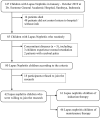Effect of Mental Health Problems on the Quality of Life in Children with Lupus Nephritis
- PMID: 32617005
- PMCID: PMC7326200
- DOI: 10.2147/NDT.S250373
Effect of Mental Health Problems on the Quality of Life in Children with Lupus Nephritis
Abstract
Introduction: Mental health problems, such as anxiety, depression, and ineffective family coping, in children with lupus nephritis (LN) can increase the severity and affect the management of the disease, thus affecting the quality of life (QoL) of patients.
Objective: Analyzing the association between levels of depression, anxiety, coping, disease activity on the QoL of pediatric patients with LN.
Patients and methods: There were 62 pediatric LN participants (16 participants in the induction phase and 46 participants in the maintenance phase). Participants were measured for anxiety, depression, coping, disease activity (systemic lupus erythematosus disease activity index/SLEDAI), and QoL. The measurement results were compared between induction and maintenance groups. Analysis of the association between anxiety, depression, coping, and disease activity with the QoL of children with LN used a multiple logistic regression test with p <0.05.
Results: The measurement results obtained anxiety (induction = 69.06±3.92 and maintenance = 45.24±10.33; p <0.001), depression (induction = 69.88±3.34 and maintenance = 42.20±9.12; p <0.001), coping (induction = 99.88±12.93 and maintenance = 115.67±7.34; p <0.001), SLEDAI (induction = 15.81±12.58 and maintenance = 0.43±1.26; p <0.001), and QoL (induction = 49.92±12.44 and maintenance = 88.15±8.06; p <0.001).. Anxiety level in the induction group (p = 0.043) and maintenance group (p <0.001; p = 0.032; p = 0.008; p = 0.009). Depression level in the induction group (p = 0.031) and maintenance group (p = 0.024; p = 0.042; p = 0.003). SLEDAI score in the maintenance group (p = 0.003; p = 0.003). Coping in induction group (p = 0.016; p = 0.016) and maintenance group (p = 0.005).
Conclusion: Mental health disorders reduce the QoL of LN children, and the level of QoL in induction phase is lower than maintenance phase.
Keywords: anxiety; coping; depression; disease activity; lupus nephritis; quality of life.
© 2020 Putera et al.
Conflict of interest statement
The authors declare that they have no conflict of interest.
Figures
References
LinkOut - more resources
Full Text Sources


